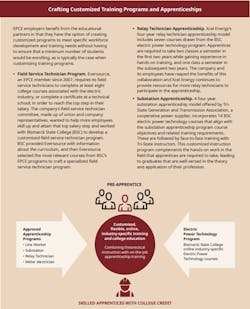Energy Providers Coalition for Education (EPCE) was initially established to address a wave of retirements faced by the energy industry in the early 2000s. In Part 1, we discussed the pivotal moment last year when EPCE began placing greater emphasis on upskilling existing employees. Here we discuss the other key workforce development strategic – credentialling.
Most participants in EPCE programs engage with learning through individual courses targeting specific skill needs, but nearly 2,000 students have completed associate, bachelor’s, and master’s degrees through the various EPCE programs. These include students who have started with individual courses or certificate programs and then “stacking” on to complete degrees, including gaining credits for prior learning from work, life, and military experiences.
Stacking to Higher Credentials
From our beginning, several educational partnerships have emerged. Bismarck State College (BSC) was the first institution to partner with the EPCE and the Council for Adult and Experiential Learning (CAEL), which serves as the connector, providing coordination and expertise. BSC Dean of National Energy Center of Excellence Bruce Emmil says during EPCE’s early days, members had identified a need for formal training in electrical power technology, specifically in the areas of transmission and distribution. “We quickly found out that a lot of these companies had their own internal training programs but a lot of it was on-the-job training, and there weren't a lot of defined outcomes or objectives.”
From this first collaborative venture, BSC’s partnership with EPCE now includes 26 different programs/offerings that provide consistency for the industry in terms of the curriculum.
Other education partners have also seen their roles grow along with the needs of the industry. Reflecting back, Jane Kelley, partnership manager at Excelsior University, says, “Excelsior’s contribution was initially just focused on nuclear technologies, but then the industry had a need to skill up managers.” Excelsior now offers several leadership and project management classes at both the undergraduate and graduate levels.
Enrollment agreements between Bismarck State College (BSC) and Excelsior University have enabled students in the BSC nuclear power technology program to build on that program and complete a bachelor’s degree at Excelsior. In another arrangement, New England energy provider Eversource works with local community colleges in Connecticut on a degree program that includes technical courses provided by BSC online. Students enroll in person at their local community college in Connecticut and take BSC courses online as part of their degree program. In this way, Eversource workers enroll in and earn degrees from their local community colleges, and the community colleges in turn can count those conferred degrees as their own, without having to build specialized degree programs from scratch.
Currently four accredited higher education institutions partner with EPCE: Bismarck State College, Excelsior University, Worcester Polytechnic Institute, and Clemson University. All EPCE programs are fully online and most learners enroll on a part-time basis. Each education partner offers a slate of customized courses and programs. The programs chosen for the partnership are based on the education providers’ areas of strength and expertise, as well as on industry needs.
ComEd’s Ken Gross, a WPI Power Systems Alumnus about EPCE says. “I love the online delivery. With lectures and weekly self-paced learning, I can complete a master’s degree while maintaining my full-time job, which can be very demanding with long hours and extensive travel. The instructors make themselves available to answer questions and provide high-quality lecture and class materials to learn from.”
BSC, located in Bismarck, North Dakota, has formed a dedicated curriculum development team made up of animators and graphic designers to work with faculty on building models of different mechanical and electrical systems that learners can interact with. The college has a number of different full-system simulators online, including a fossil-fuel power plant, a combined cycle unit, a miniature transmission power grid system, and a nuclear power plant. In addition, they have designed and built hundreds of interactive learning tools including animations, mini-simulations, exercises, and more. Excelsior offers similar tools to enhance the learning experience.
Providing Tuition Reimbursement Options
Typically, EPCE members identify specific training needs within their organizations and send a cohort of employees to participate in a set of targeted courses at BSC. In addition to this group training pathway, employees seeking professional development can enroll in certificate or degree programs themselves. EPCE members receive tuition discounts for their employees who enroll in these programs, which can be up to 40%, depending on the college. Members offer tuition reimbursement incentives–one of the tenets of energy employers right from the beginning–ranging from $5,000 to $10,000 per year for each employee. CAEL works with member organizations to assist with the logistics of applying these benefits to the programs.
Tribal Partnership
The Native Energy Workforce Education Consortium (NEWEC) is a proposed partnership between Haskell Indian Nations University, a tribal land-grant university, and Southwestern Indian Polytechnic Institute, with the goal of creating energy education career pathways for Tribal members in the future energy economy.
Opportunities for growth in this area are strong, both for individuals seeking employment in energy companies (many of which are operating adjacent to reservation land), as well as for those who seek to form their own ventures in solar, wind, and other utilities.
Although it is in early stages, EPCE has ambitious goals for the NEWEC consortium, and aims to operationalize the program within three to four years. During this period, the goal is to encourage more Tribal Colleges and Universities to join the consortium, create a centralized energy education hub to advance graduate students into current positions in the energy sector, and support federally required Tribal consultations through Tribal history and traditional knowledge.
Ensuring Student Success
EPCE’s education partners are acutely aware of the needs of working adults taking online programs and have structures in place to ensure learners are supported as they progress through the courses or programs. Dedicated advisors and/or frequent check-ins to make sure students are getting the support they need. Students are made aware of opportunities to earn credit for prior learning (CPL), as many students bring learning from work, life, and military experiences.
Crafting Customized Training Programs and Apprenticeships
Eversource, an EPCE member since 2007, requires its field service technicians to complete at least eight college courses associated with the electric industry, or complete a certificate at a technical school, in order to reach the top step in their salary. The company’s field service technician committee, made up of union and company representatives, wanted to help more employees skill up and attain that top salary step and worked with Bismarck State College (BSC) to develop a customized field service technician program. BSC provided Eversource with information about the curriculum, and then Eversource selected the most relevant courses from BSC’s EPCE programs to craft a specialized field service technician program.
Xcel Energy’s four-year relay technician apprenticeship model includes seven courses drawn from the BSC electric power technology program. Apprentices are required to take two classes a semester in the first two years while gaining experience in hands-on training, and one class a semester in the subsequent two years. The company and its employees have reaped the benefits of this collaboration and Xcel Energy continues to provide resources for more relay technicians to participate in the apprenticeship.
A four-year substation apprenticeship model offered by Tri-State Generation and Transmission Association, a cooperative power supplier, incorporates 14 BSC electric power technology courses that align with the substation apprenticeship program course objectives and related training requirements. These are followed by face-to-face training with Tri-State instructors. This customized instruction program complements the hands-on work in the field that apprentices are required to take, leading to graduates that are well-versed in the theory and application of their profession.
The Impact of Credentialling
In 2021, 3,355 learners were enrolled in EPCE courses. About two-thirds of EPCE program enrollments (69%) were enrolled in individual courses, certificate programs, or associate degrees, with the remaining third (31%) in bachelor’s and/or master’s programs.For EPCE students pursuing credentials, there are impressive persistence and completion results: at BSC, for example, 88% of students enrolled in Fall 2021 in the electrical power technology program either went on to continue a course in Spring 2022 or graduated.
Similarly, Worcester Polytechnic Institute (WPI) has a retention rate in both of its programs of approximately 90%. Excelsior, meanwhile, has successfully graduated 685 students with 48% earning a Bachelor of Science in Nuclear Engineering Technology since the partnership inception.
“I would recommend any engineer in the power industry to take advantage of these cources,” said John Sonnelitter, then Protection & Controls Engineer at Florida Power & Light Corporation, currently Senior Engineer, PPL Corporation. “The EPCE program provide through WPI had a good balance between theoretical and practical power system applications.”
Students who graduate from EPCE programs go on to secure job promotions, pay increases, and new employment opportunities in the industry. Data from 2020 and 2022 alumni surveys show that graduates are highly satisfied with EPCE programs and that they perceive the impact of their studies positively.
Angie Lucas is Director of the Energy Providers Coalition for Education and Director of Engagement for The Council for Adult and Experiential Learning, (CAEL), which will hold it’s Annual Coalition Meeting in October. Her responsibilities include fostering collaboration between energy employers and corporations, associations, contractors, and higher education institutions to design and deliver industry-approved education solutions that support training, upskilling, and reskilling of employees to meet today's energy workforce needs and prepare for the energy workforce of the future.
Lucas’s prior employments included working with the National Conference of State Legislatures (NCSL) where she served as a liaison between tribal leaders, the U.S. Department of Energy, industry partners, and other stakeholders to address issues impacting energy and infrastructure development across tribal lands. She also served as project manager with the Indiana State Museum and Historic Sites, with responsibilities for research, educational program development, public/private partnerships management, and writing and administering grants.
Lucas earned her bachelor’s in Native American Social History and master’s degrees in Non-Profit Leadership at Saint Mary of the Woods College. She serves on the Advisory Board for the Electric Power Conference and volunteers with Be My Eyes, Music and Memory, and the National Park Service.
Lana Munip is Senior Research Director at CAEL. She previously was an analysis and planning consultant and assistant editor with The Pennsylvania State University Libraries, where she led various qualitative and quantitative research projects related to the library system, including multiple studies of the library experiences of diverse student subpopulations, the library’s response to Covid-19, and various large-scale survey projects. Skilled in data analysis, data visualization, qualitative research, planning & assessment, and communications, Munip also is a NVIVO 12 certified expert.
Lana holds a master’s degree in higher education (M.Ed.) with a concentration in institutional research from the Pennsylvania State University, a master’s degree in television-radio-film from Syracuse University, and a bachelor’s in economics from the University of Stirling. She is currently pursuing her PhD in higher education at the Pennsylvania State University. Munip spent her early career years as a journalist in Kuala Lumpur, Malaysia.
Originally established in 1974 at the Council for Adult and Experiential Learning, Strada Collaborative, Inc. d/b/a CAEL, a nonprofite 501(c)(3) Indiana nonprofit corporation.
© 2022 Strada Collaborative, Inc. d/b/a CAEL. All rights reserved.



